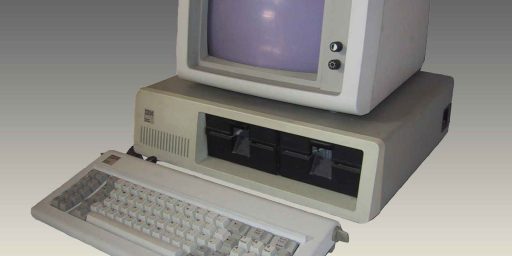Faster is Better
NYT: Intel Concedes 64-Bit Chips Are Wave of the Future
The Intel Corporation, which has long dominated the computer microprocessor market it created in 1971, did an abrupt about-face on Tuesday, announcing that it would follow the lead of its much smaller rival, Advanced Micro Devices, by building 64-bit capability into its most popular chips.
The strategy reversal is a setback for Intel, the world’s largest chip maker, which had been trying to convince computer users that more powerful 64-bit processing aimed at heavy-duty corporate and scientific computing should be handled exclusively by its ambitious, but incompatible, Itanium processors. Until today, Intel, based in Santa Clara, Calif., had publicly sought to continue with 32-bit operations for personal computer and small server applications relying on its Pentium and Xeon processor lines.
That approach, however, was thwarted by A.M.D., the microprocessor industry’s plucky second fiddle. A.M.D., from Sunnyvale, Calif., took a different tack, gambling on creating a new line of chips that included special 64-bit extensions, making it possible to run traditional 32-bit Intel-compatible programs as well as newer 64-bit software.
That gamble has now paid off with the announcement today from Craig Barrett, Intel’s chief executive, that his company plans to add 64-bit capabilities to its Xeon server processors during the next quarter and incorporate similar 64-bit processing features in its next-generation Pentium processors, known as Prescott, before the end of the year.
The Intel announcement gives programmers and PC makers an incentive to commit to 64-bit chips immediately, putting A.M.D. in the lead until Intel is able to get its 64-bit chip to market.
Not long ago, 64-bit computing – which allows data to move through a computer far more quickly and makes it possible for the microprocessor to handle much greater amounts of memory at any one time – was thought of as useful only for the most esoteric scientific and engineering applications. But with consumer PC tasks like video editing and even game playing soaking up immense amounts of computing effort, that view has changed.
This would seem like a no brainer–the trend has been to embrace faster chips and figure out how to exploit them later. If 64-bit chips improve John Madden Football, surely they’ll come up with a way to make them improve personal computing.






I’m not sure the 64 bit processor helps me read faster or type faster. I dig John Madden Football though. Particularly the
half time antics!
—